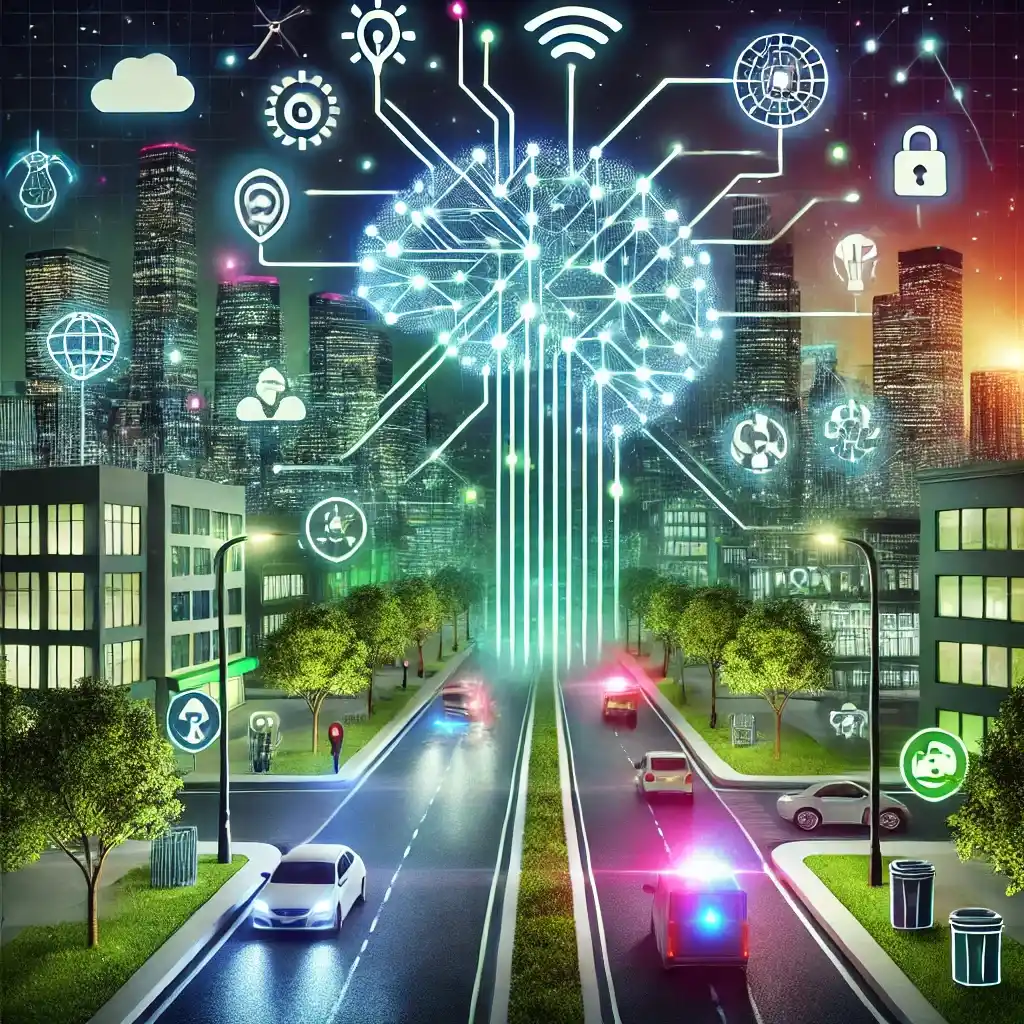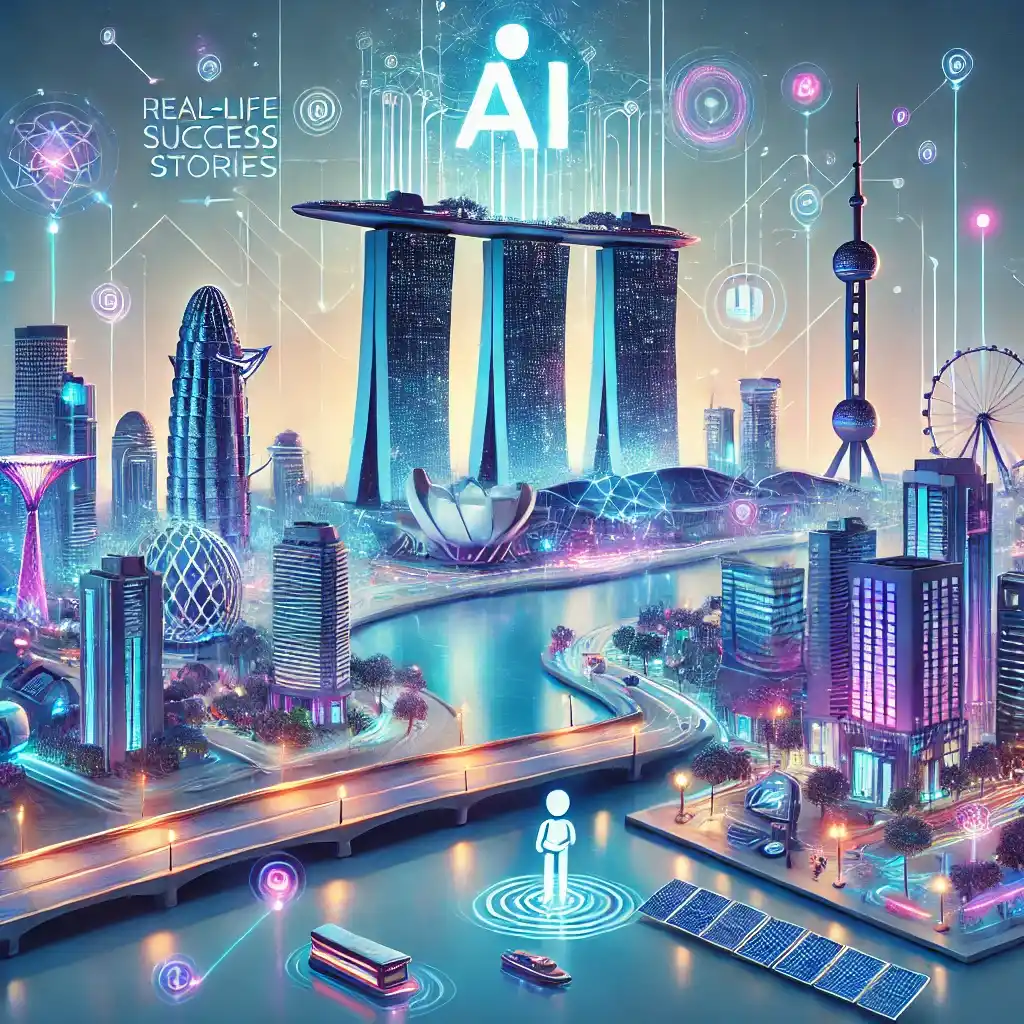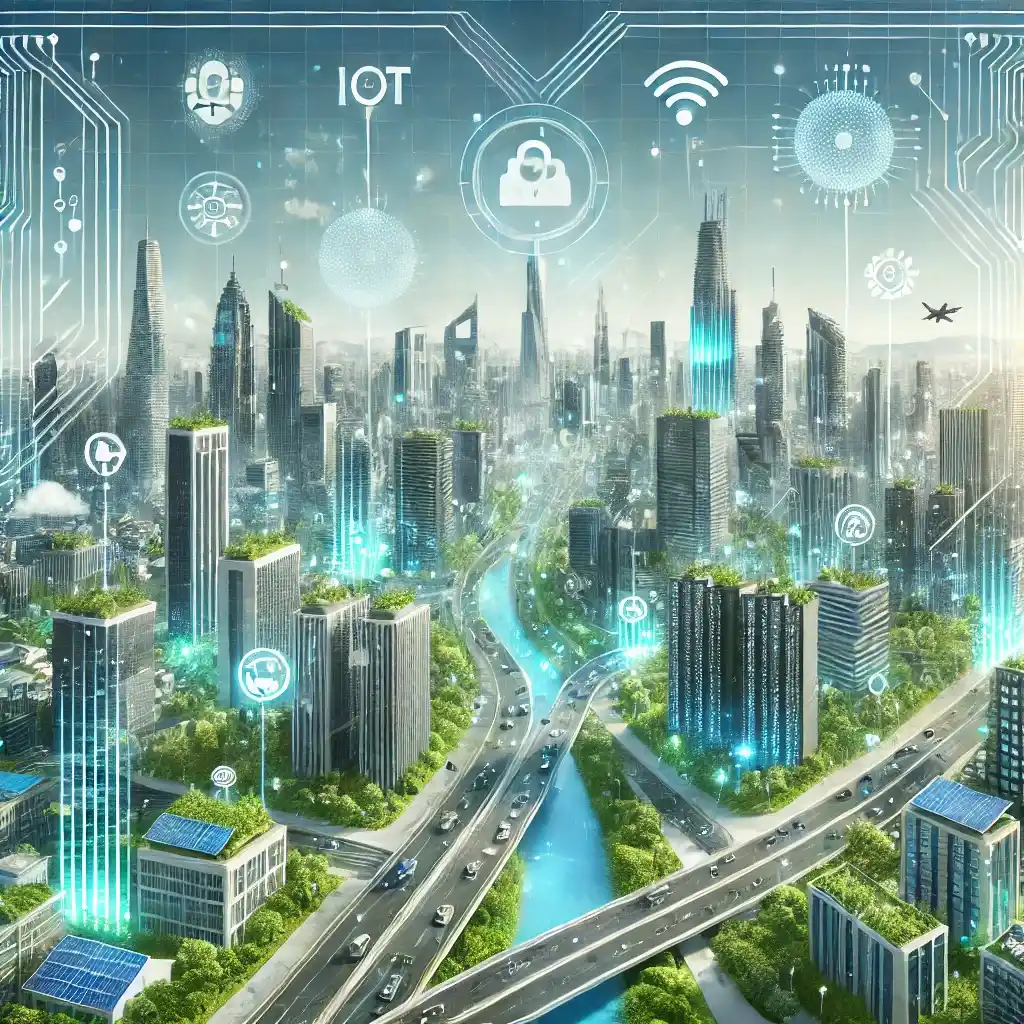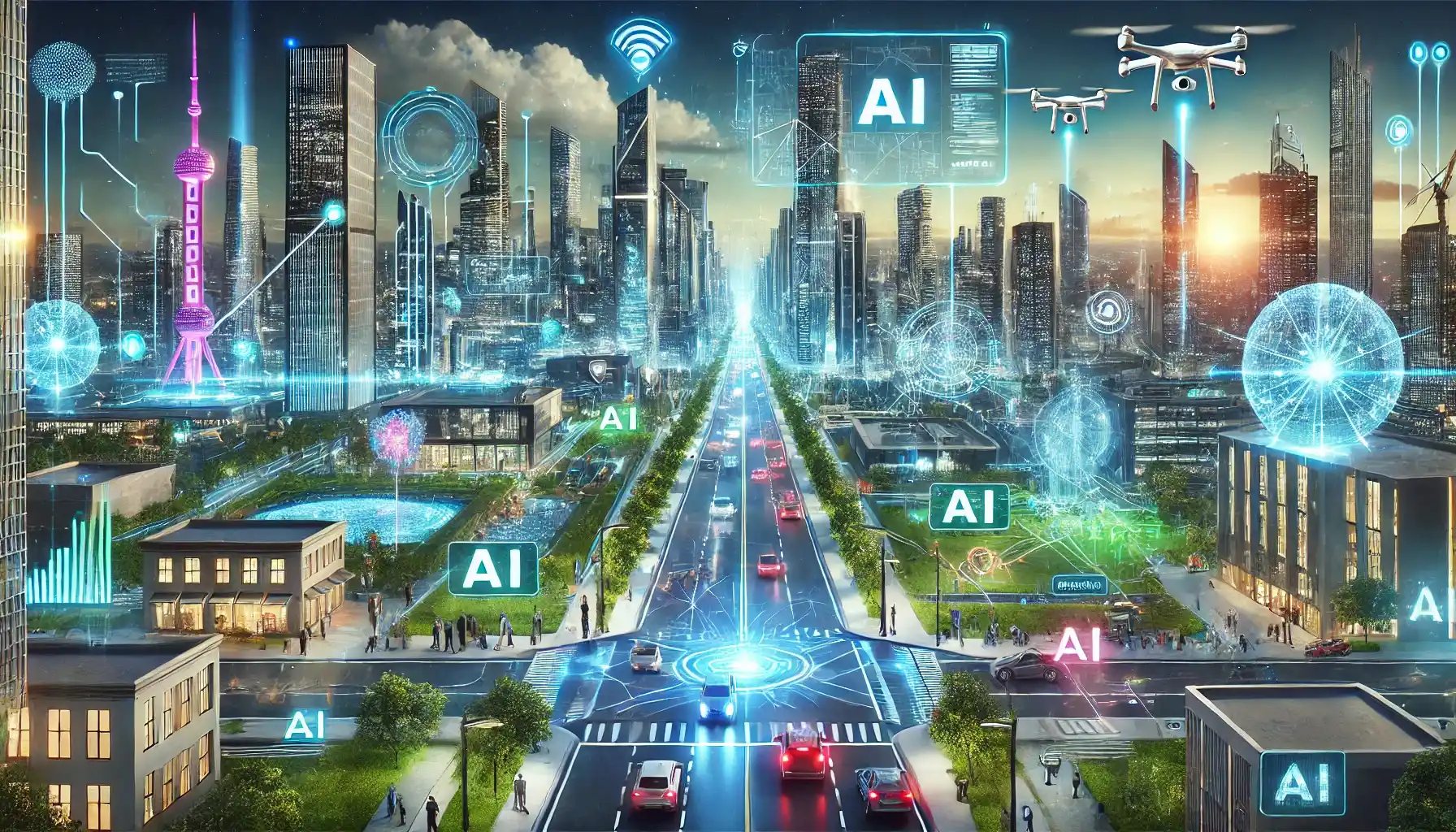The rise of manufactured insights is reshaping the way we live, work, and connect inside cities. From overseeing activity to optimizing vitality, AI is turning urban regions into more intelligent, more effective situations. With the developing challenges of populace development, climate change, and framework requests, cities are progressively looking to AI as an arrangement to make strides in regular life. AI-driven advances are not fair upgrading services—they’re making cities more maintainable, bearable, and responsive.
In this web journal, we’ll investigate how AI is changing urban living, from activity administration to open security, and how these headways are clearing the way for the cities of tomorrow. As savvy cities proceed to advance, AI will be at the heart of the transformation, making urban living more astute and more associated. Let’s jump into the future of AI and its effect on our cities.
What Is a Smart City?
A smart city employs innovation to make strides in urban life. These cities use developments like IoT (Web of Things), AI (Manufactured Insights), and enormous information to oversee framework, administrations, and assets more productively. The objective is to upgrade the quality of life for inhabitants whereas guaranteeing the city runs easily and sustainably.

Key Characteristics of a Smart City:
IoT (Internet of Things): Savvy cities are filled with sensors that collect real-time information, such as activity designs, vitality utilization, and discuss quality. This information makes a difference as city organizers make educated decisions.
AI (Artificial Intelligence): AI forms the information collected from sensors, making expectations and computerizing forms like activity stream, squander collection, and vitality management.
Data-Driven Choice Making: Cities utilize collected information to optimize administrations. For example, AI frameworks can anticipate activity clog and alter signals to decrease delays.
Examples of Savvy Cities in Action:
Singapore is a pioneer in shrewd city tech. Its AI-powered activity administration framework makes a difference to diminish blockage by altering activity lights in genuine time based on activity data.
Barcelona employs keen lighting and squander administration frameworks. Sensors in squander containers inform the city when they require to be purged, lessening costs and making strides efficiency.
Amsterdam has created shrewd frameworks that utilize AI to optimize vitality dissemination, lessening squander and progressing sustainability.
Why Smart Cities Matter:
As cities develop, they confront challenges like stuffing, contamination, and obsolete frameworks. Savvy cities offer arrangements by utilizing innovation to handle these issues. For example, they can decrease vitality utilization, make strides open transportation, and indeed make urban spaces greener. With the world’s urban populace anticipated to reach 68% by 2050, keen cities are vital for making maintainable, bearable situations.
The Role of AI in Shaping Smart Cities
AI is getting to be the spine of keen cities, revolutionizing how urban situations work. From overseeing activity to improving open security, AI is the key to making more effective, maintainable, and associated cities. Here’s how AI is forming the future of urban living.
AI’s Fundamentally Part in Urban Development
Smart cities depend intensely on manufactured insights to mechanize forms and optimize administrations. At the center, AI employs machine learning to analyze tremendous sums of information in genuine time. It makes a difference urban organizers foresee future patterns, whereas prescient analytics can estimate everything from activity designs to vitality utilization. AI moreover empowers robotization in day by day assignments, decreasing the required for human intercession and making city frameworks more efficient.
Real-Life Applications of AI in Smart Cities
Activity Administration| Optimizing Urban Mobility
AI-powered activity frameworks in Singapore give a culminating case of AI in activity. The city’s AI arranges information from activity sensors and alters activity lights in genuine time to decrease clog. By analyzing activity streams and making moment changes, the framework keeps streets moving easily, decreases travel times, and makes a difference in lower contamination levels.
Vitality Proficiency| Savvy Frameworks and Sustainability
AI is too changing vitality administration. Los Angeles employs AI in its keen network framework, which disseminates vitality more productively. The framework analyzes request and alters control supply appropriately, making a difference to anticipate vitality squander and supporting supportability objectives. This decreases by and large vitality utilization, making the city greener and more cost-effective.
Open Security| Upgrading Security with AI
AI-driven innovations are making strides in open security. Chicago employs AI in its Prescient Policing activity, which analyzes wrongdoing information to anticipate where violations are likely to happen. This permits the police to distribute assets more successfully, diminishing wrongdoing rates and making strides in community security.
Data and Connectivity| The Backbone of Smart Cities
Shrewd cities are fueled by information, and the establishment of this advanced change is built on a network. From sensors inserted in urban foundations to the Web of Things (IoT) gadgets scattered over cityscapes, these innovations collect and transmit endless sums of information. AI depends intensely on this information to make shrewdly, real-time choices that optimize everything from activity stream to vitality consumption.
The Part of Information| How AI Depends on Real-Time Information
In a shrewd city, each associated device—from activity lights to savvy meters—sends information to AI frameworks, which prepare it to make strides in city life. For example, AI-powered activity frameworks collect real-time information on street conditions, permitting cities to alter activity designs on the fly and anticipate clog. This steady stream of information permits AI to anticipate patterns and robotize activities, such as altering road lighting or overseeing squander collection schedules.
5G and IoT| Fueling AI with Speed and Connectivity
The 5G organize and IoT are basic in making AI work successfully at the scale of a whole city. 5G offers ultra-fast information exchange speeds and moo inactivity, which implies AI frameworks can handle information nearly immediately. This real-time speed is vital for applications like independent vehicles, where delays of indeed a few seconds can result in mishaps. So also, IoT gadgets give the physical infrastructure—sensors, cameras, and savvy appliances—that nourishes information into the AI frameworks. Together, 5G and IoT guarantee that cities can run easily and react rapidly to changing conditions.
Security and Protection| Exploring the Challenges of Information Collection
While information is the soul of shrewd cities, its collection raises vital security and security concerns. AI frameworks depend on individual information, such as activity designs, vitality utilization, and indeed wellbeing data, to move forward urban administration. This dependence makes shielding that information a best need. Cities must execute solid cybersecurity measures and build up clear rules on information utilization to secure citizens’ security. Straightforward approaches and encryption innovations are basic in building belief and guaranteeing that information collection benefits the open without compromising personal rights.
Real-Life Success Stories of AI in Smart Cities

Smart cities are leveraging AI to handle urban challenges and improve the quality of life for their inhabitants. Let’s investigate three real-life cases from Singapore, Barcelona, and Amsterdam, where AI is making a critical effect on urban living.
Singapore| A Pioneer in Shrewd City Technology
Singapore is one of the world’s most advanced cities, utilizing AI and IoT (Web of Things) to oversee urban life more effectively. The city’s AI activity administration framework alters activity signals in real-time based on activity stream, diminishing blockage and contamination. By collecting information from sensors and cameras over the city, the framework predicts activity designs, making streets more secure and more efficient.
In expansion to activity, Singapore employs AI-assisted crisis administrations. The city conveys AI instruments to anticipate crisis circumstances like mishaps or fires. This permits for speedier reaction times and way better assignment of assets. Another illustration of AI integration is savvy squander administration. Squander canisters prepared with sensors inform city laborers when they are full, guaranteeing convenient collection and diminishing flooding trash.
Barcelona| Maintainability at Its Core
Barcelona is another fabulous case of AI making cities greener and more maintainable. The city has executed savvy squander canisters that consequently compact squander and inform the nearby specialists when they are full. This framework makes a difference to optimize collection courses and diminishes pointless trips, sparing fuel and cutting down on emissions.
Barcelona has coordinated AI for keen water administration. The framework screens water utilization over the city and alters conveyance based on real-time request. This makes a difference in decreasing squander and guarantees a more feasible water supply for residents.
Amsterdam| Revolutionizing Vitality Efficiency
Amsterdam is at the cutting edge of shrewd framework and vitality administration. The city has conveyed an AI-powered keen framework that optimizes power dispersion. It employs information from homes and businesses to figure vitality needs, guaranteeing the lattice works proficiently. This framework makes a difference to avoid over-burdening and decreases vitality squander, making Amsterdam one of the most energy-efficient cities in Europe.
In expansion, Amsterdam energizes citizens to take part in energy-saving activities. AI-based apps permit inhabitants to track their vitality and get proposals on how to spare power, advancing maintainability over the city.
From Singapore’s activity frameworks to Barcelona’s squander administration and Amsterdam’s keen networks, these cities exhibit the control of AI to make urban living more proficient, economical, and associated. As AI proceeds to advance, we can anticipate these cities to set modern benchmarks for shrewd urban living around the world.
The Challenges of Implementing AI in Urban Environments
The Challenges of Actualizing AI in Urban Environments
As cities around the world turn to AI to move forward urban living, there are a few key challenges that require to be tended to. Whereas AI holds the potential to revolutionize urban life, its execution is not without obstacles. These challenges can affect the speed and victory of AI selection in cities.
Infrastructure Challenges| Obsolete Frameworks and Financing Limitations
One of the greatest deterrents to AI appropriation is obsolete foundation. Numerous cities depend on bequest frameworks that were never planned to handle the complexities of cutting edge AI advances. These obsolete frameworks can’t bolster the information stream and real-time decision-making required by AI applications.
Additionally, actualizing AI arrangements frequently requires noteworthy budgetary ventures. Numerous urban regions, particularly those in creating locales, confront financing limitations. Without the vital assets, cities battle to contribute in the innovation and framework required for AI integration. This budgetary burden moderates down advance and limits the versatility of savvy city initiatives.
Public Concerns| Security, Observation, and Work Displacement
Public skepticism is another major jump. Numerous individuals are concerned about the collection and utilization of their individual information. With AI frameworks depending intensely on information to work, there are true blue stresses around security. Citizens stress that their developments, propensities, and indeed discussions may be observed without their consent.
Surveillance is another petulant issue. Whereas AI can upgrade open security, it can too be seen as an attack of protection. The thought of consistent checking raises fears of a “Huge Brother” society, which can lead to open resistance.
Job uprooting is however another concern. As AI takes over errands customarily done by people, there is fear that mechanization might lead to far reaching unemployment. Numerous individuals stress almost the effect of AI on their employments, especially in divisions like transportation, retail, and manufacturing.
Regulation and Administration| Finding the Right Balance
For AI to be effectively executed in urban situations, solid controls are required. Governments must make approaches that secure citizens’ rights whilst cultivating advancement. The challenge is finding the right adjustment between empowering AI improvement and guaranteeing that it’s utilized ethically.
Regulations must address key issues such as information protection, straightforwardness in AI decision-making, and the dependable utilization of reconnaissance advances. At the same time, laws ought to bolster the continued development of AI, guaranteeing that it benefits all citizens, not fair to a select few.
Governments, innovation companies, and urban organizers must work together to make a system that equalizes mechanical advance with citizen security. As it were at that point can AI fulfill its potential in changing cities whereas regarding the rights and concerns of the individuals it points to serve.
The Future of AI in Smart Cities| What’s Next?
As savvy cities proceed to advance, AI is balanced to play an indeed more critical part in forming our urban future. Be that as it may, to really open its potential, there are a few challenges and rising patterns to consider.

Infrastructure Challenges
Despite its potential, numerous cities confront obsolete foundations and budget imperatives. Maturing frameworks and restricted subsidizing can moderate down the integration of AI. For example, a city with ancient activity signals may battle to actualize AI-powered activity administration frameworks. Upgrading foundation requires considerable venture, and without legitimate financing, numerous cities might delay their AI aspirations. Overcoming these challenges is basic for realizing the full benefits of AI.
Emerging Trends
Several energizing patterns point to the future of AI in shrewd cities. Independent vehicles are one of the most expected advancements. These self-driving cars will diminish activity clog, lower outflows, and improve street security. AI-driven healthcare is another region of development. Cities will utilize AI to screen open wellbeing patterns, foresee infection episodes, and optimize restorative assets. Besides, AI in administration will move forward decision-making. By analyzing tremendous sums of information, AI can offer assistance urban organizers make educated, data-driven choices that advantage residents.
The Significance of Sustainability
AI will moreover play a basic part in making cities more maintainable. It will offer assistance to optimize vitality utilization through savvy lattices, lessening squander and carbon outflows. In squander administration, AI can foresee squander designs and streamline collection plans, cutting down pointless trips. AI will moreover screen discuss quality and climate conditions, making a difference as cities adjust to natural challenges. The result? More maintainable, eco-friendly urban spaces.
Long-Term Vision
Looking ahead, AI in keen cities will do more than fair progress productivity. It will improve the quality of life. We’ll see AI making more secure, more beneficial, and more impartial situations. From diminishing contamination to making strides open administrations, AI will make cities more decent for everybody. In the long run, AI will not fairly alter how we explore cities—it will alter how we involve urban living.
AI is as of now reshaping urban living, making cities more brilliant, more proficient, and maintainable. From activity administration to vitality utilization and open security, AI is upgrading how we explore and connect with our situations. As we see into the future, innovations like independent vehicles, AI-driven healthcare, and more astute urban administrations will proceed to progress our cities. Be that as it may, for AI to reach its full potential, we must guarantee its coordinates keenly. Adjusting development with moral contemplations, security, and availability is crucial.
The role of AI in savvy cities is irrefutable. As citizens and tech devotees, it’s energizing to envision how these advancements will shape our everyday lives. The future of urban living is shining, but it depends on how we oversee and advance these advances. Are we prepared to grasp this future?


[…] emerging markets afford smart cities, and what makes AI solutions viable? Building savvy cities in developing economies might seem like a costly dream, but AI is making it […]